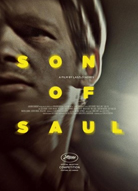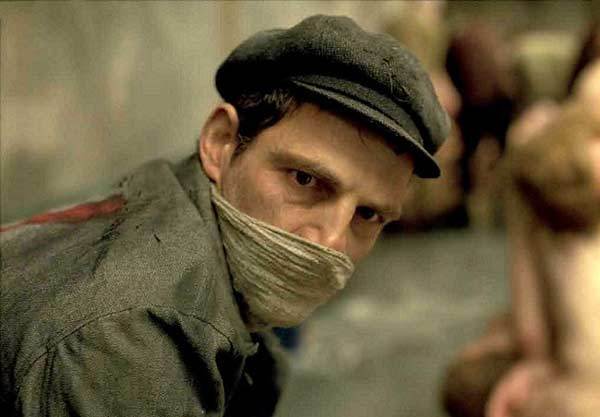Manuel here reporting from the New York Film Festival on Hungary's Oscar submission, a powerful debut film...
 The Holocaust film is, as historical subgenres go, perhaps the most well-worn. From John Ford and George Stevens’ documentary footage of the camps liberation all the way through Spielberg’s Schindler’s List and Benigni’s Life is Beautiful, cinema has been irrevocably tied to our cultural remembrance of that most barbaric killing machine. Cinema’s ability to record, to bear witness, has no doubt played a central role in this artistic canon. Of course, at the heart of the cinematic project of the Holocaust lie conflicting and controversial ethical questions. From Theodor Adorno’s “There is no poetry after Auschwitz” dictum to storied arguments about the validity and usefulness of recreating the images of Western civilization’s most gruesome chapter, directors, victims, and historians have asked plenty of hard to answer questions.
The Holocaust film is, as historical subgenres go, perhaps the most well-worn. From John Ford and George Stevens’ documentary footage of the camps liberation all the way through Spielberg’s Schindler’s List and Benigni’s Life is Beautiful, cinema has been irrevocably tied to our cultural remembrance of that most barbaric killing machine. Cinema’s ability to record, to bear witness, has no doubt played a central role in this artistic canon. Of course, at the heart of the cinematic project of the Holocaust lie conflicting and controversial ethical questions. From Theodor Adorno’s “There is no poetry after Auschwitz” dictum to storied arguments about the validity and usefulness of recreating the images of Western civilization’s most gruesome chapter, directors, victims, and historians have asked plenty of hard to answer questions.
Does the depiction not merely replicate the dehumanization on which that enterprise depended? Is there a way to narrativize this barbaric act without simplifying history? Can cinema’s images ever do anything more than ring hollow when compared with the immensity of human life lost?
If all of this sounds heady as an intro to a review of László Nemes’s debut film Son of Saul, you should’ve heard leading man (and poet) Géza Röhrig and his director talk at length about these very issues while quoting Primo Levi at the press conference a few days ago...

Their eloquent Q&A felt more like an upper-level seminar on the subject, showing a degree of care and awareness that has become all but necessary when advocating making yet another Holocaust film. “I needed to find a new angle,” Nemes confessed, and while Son of Saul has both a visual and thematic angle that makes it stand out from the long cinematic history to which it is indebted, it’s clear such an angle was not taken lightly and what may look like a visual gimmick, is in fact, proof positive of the ethical orientation of the film itself.
Nemes’ film is centered on the Sonderkommando (Jews forced to work the camps). Throughout the entire film we follow just one of them, Saul. After seeing one young man survive the gas chamber only to be killed by a Nazi doctor soon after, and believing him to be his son, he spends the rest of the film attempting to give him a proper burial even as those around him plan a revolt. Called the “crematorium ravens” by Levi himself, Röhrig remarked that the Sonderkommando’s histories (which had for the longest time been buried in shame given their instrumental role in the camps themselves) remain vivid reminders that the Nazis had created the most sophisticated extermination machine in Western history: “They made Cains out of Abels… depriving from them even the solace of being innocent.” (Honestly, I could have listened to Röhrig’s dulcet-toned voice lecture me all day on this film)
Nemes noted that he wanted to show “how limited the individual is in the concentration camp” and his framing reflects this. The camera follows Saul so closely that everything else is left in the background. We catch glimpses of bodies (or “pieces” as the Nazis call them), glances from fellow Jews, and blurred suggestions of the ghastly death machine that was Auschwitz but Nemes’ camera seldom lingers on them, sticking with Saul during long takes that create an intentional sense of claustrophobia and confusion. Röhrig’s pained determination don’t command the screen as much as fill it completely, so as to blot out the human tragedy around him, though, of course in so doing further making it ever present. It is an aesthetic way to both show and not show the camp; of denying the viewer any critical distance from the death all around, constricting our view and reducing us to follow Saul as he navigates the camp in his attempt at gracing this one body with the dignity denied the thousands around him.
Even in describing the film, I will not be able to recreate for you the visceral effect it has on you as a viewer, or the way it grabs you and never lets go. For a debut film it is astounding, and while that pesky Foreign Film race loves itself some curveballs, especially prior to nomination day, I expect we’ll be hearing a lot more about Nemes’ remarkable Son of Saul on the leadup to the Oscars.
